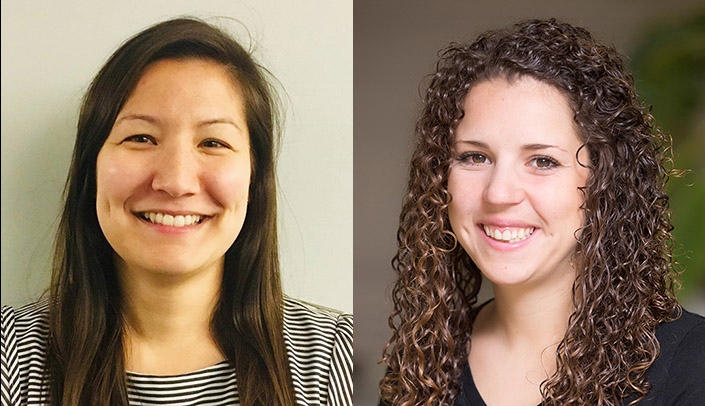Elizabeth Preas and Alethea Chiappone are 2019-2020 recipients of the Buffett Institute Graduate Scholars Fellowship. The two doctoral students at UNMC are pursuing research, supported by the Buffett Early Childhood Institute, that will make a difference in the early childhood field.
Elizabeth Preas, who completed her final year of doctoral work at the Munroe-Meyer Institute at UNMC, conducted research in two areas of caregiver training.
The first is how to train caregivers to teach basic self-care skills to their child with autism. In her years of clinical practice, Preas observed a tendency to focus caregiver training on problems or behavioral issues. However, parents and caregivers also need help teaching self-care skills (e.g., hygiene and dressing) using effective teaching procedures. These skills are complicated because they require multiple steps to complete and tend to be neglected to address more urgent behavioral issues.
The other area of caregiver training she evaluated was the efficiency of training — specifically, how to incorporate real-time feedback as an approach to caregiver training to work within the boundaries of a family’s daily life. Preas has collected the data and is now using a fellowship from the Buffett Institute Graduate Scholars program to analyze and prepare her findings for publication.
Her advisor, Therese Mathews, Ph.D, associate professor in the UNMC College of Nursing, said Preas’ work carries significant value, since the rate of children diagnosed with autism has steadily risen over the past two decades.
“There are not enough health care providers to keep up with all the demands that caregivers and families have with the disabilities that are associated with autism,” Mathews said.
Chiappone is leading a project that combines research and technology to observe nutrition and physical activity practices through an app.
The idea was inspired when Chiappone and her colleagues at the Gretchen Swanson Center for Nutrition perceived limitations in observational techniques while working on a pilot study evaluating nutrition and physical activity in family child care homes (FCCs). FCCs provide in-home, non-relative child care for infants and young children. They tend to be an under-researched population, and “they are more likely to care for children from low-income households, rural communities, and or racial or ethnic minority groups,” Chiappone said.
“Studies indicate that promotion of healthy eating and active living in early childhood reduces the risk for obesity throughout the lifespan,” said Brandon Grimm, Ph.D., Chiappone’s adviser and associate dean of public health practice in the UNMC College of Public Health. “Through this project, we are developing a tool to assist program implementers to better understand the context in which FCC programs operate.”
Chiappone’s app will allow FCC providers to snap and upload photos throughout the day of healthy eating and active living practices. Program implementers can use that data to deliver support tailored to family child care providers. It could be of particular benefit for rural FCC providers.
“An app was a way to make the process more efficient and reduce bias,” Chiappone said. “It’s a one-stop shop. And the output is more organized for the research end of things.”
